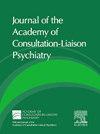Medical Psychiatry Units: A Delphi Consensus Approach to Defining Essential Characteristics
IF 2.7
4区 心理学
Q2 PSYCHIATRY
Journal of the Academy of Consultation-Liaison Psychiatry
Pub Date : 2025-03-01
DOI:10.1016/j.jaclp.2024.09.004
引用次数: 0
Abstract
Medical psychiatry units (MPUs), also known as complexity intervention units, represent an important innovation for integrating medical and behavioral health care in the hospital setting, thereby reducing the need for sequential medical and psychiatric hospitalization. As US hospitals face an increased demand for mental health services, interest in the MPU model is gaining momentum. However, there is no shared definition for what constitutes an MPU, and significant variation exists among units across the United States that have been designated as an MPU. The lack of a unified definition for MPUs results in significant variability and poses challenges for creating new MPUs and studying existing MPUs. To address this gap, the Medical-Psychiatry Unit Consortium recruited a panel of MPU experts to conduct a consensus study. The consortium used a survey to assess the relative importance of various characteristics of MPUs within the following categories: structural organization, environment and design, spectrum of care, staffing, and culture of care.
After two rounds of a modified Delphi process, consensus was achieved with regard to which characteristics are necessary or preferred vs. not necessary or harmful. The necessary or preferred characteristics include those that would be expected on a general medical unit, such as having cardiac telemetry monitoring capabilities, as well as characteristics typical of a psychiatric unit, such as locked unit doors, locked cabinets for patient belongings, and common area or milieu. Overall, this suggests that an ideal MPU combines the ability to provide acute medical care with acute psychiatric care. Notably, staffing and culture of care emerged as categories with the highest ranking of necessary characteristics, outweighing environment, design, or the breadth of services offered. These findings suggest that MPU experts feel teamwork and having a shared mission are critical components of effective MPUs and highlight the importance of staff recruitment and training.
内科精神科病房:采用德尔菲共识法确定基本特征。
精神科医疗单元(MPUs),又称复杂性干预单元,是在医院环境中整合医疗和行为保健的一项重要创新,从而减少了医疗和精神科连续住院的需求。随着美国医院对心理健康服务的需求不断增加,人们对 MPU 模式的兴趣也日益高涨。然而,对于什么是 MPU 并没有一个共同的定义,美国各地被指定为 MPU 的单位之间也存在着很大的差异。缺乏对 MPU 的统一定义导致了巨大的差异,为创建新的 MPU 和研究现有 MPU 带来了挑战。为了填补这一空白,医疗-精神病学单位联盟招募了一个由多学科综合单位专家组成的小组来开展一项共识研究。联合会通过一项调查来评估多学科综合病房在以下类别中各种特征的相对重要性:结构组织、环境和设计、护理范围、人员配备和护理文化。经过两轮修改后的德尔菲程序,就哪些特征是必要的或首选的,哪些特征是不必要的或有害的达成了共识。必要或首选的特征包括普通医疗单元应有的特征,如具备心电遥测监控功能,以及精神科单元的典型特征,如单元门上锁、病人物品柜上锁、公共区域或环境上锁。总体而言,这表明理想的重症监护病房应兼具提供急症医疗护理和急症精神病护理的能力。值得注意的是,人员配备和护理文化是必要特征中排名最高的类别,超过了环境、设计或所提供服务的广度。这些研究结果表明,多学科综合病房专家认为团队合作和共同的使命是有效的多学科综合病房的重要组成部分,并强调了人员招聘和培训的重要性。
本文章由计算机程序翻译,如有差异,请以英文原文为准。
求助全文
约1分钟内获得全文
求助全文
来源期刊

Journal of the Academy of Consultation-Liaison Psychiatry
Psychology-Clinical Psychology
CiteScore
5.80
自引率
13.00%
发文量
378
审稿时长
50 days
 求助内容:
求助内容: 应助结果提醒方式:
应助结果提醒方式:


